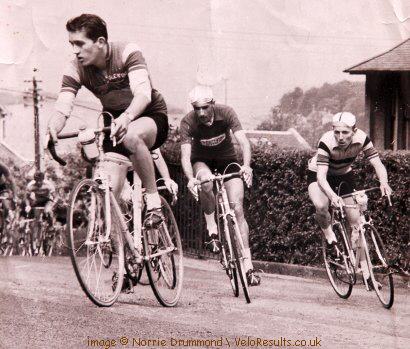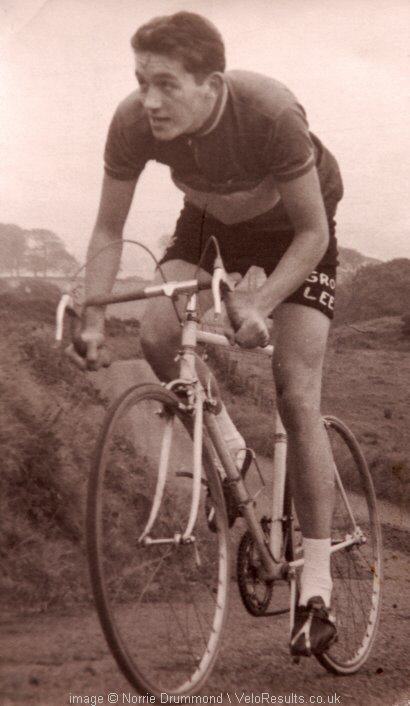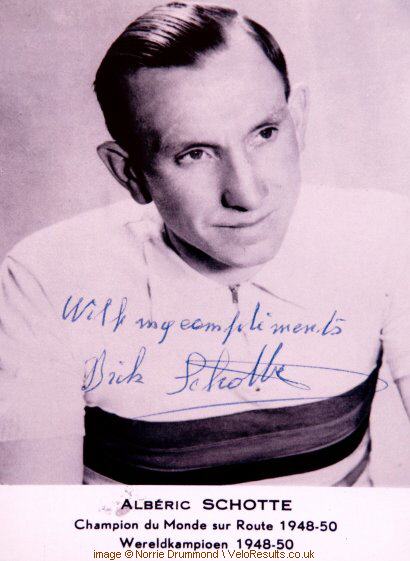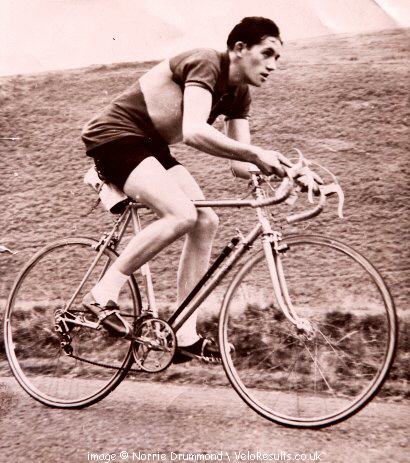It’s just under two weeks now until the 2007 European season starts with the GP d’Ouverture La Marseillaise in the south of France on February 6th. The first major tests come a few weeks later though, on the first weekend in March, far from the Mediterranean, to the north, in Flanders.
Het Volk and Kuurne-Brussels-Kuurne are true classics in all but UCI category, albeit shorter than the Tour of Flanders with which they share many kilometres of parcours.
There’s an amateur version of Het Volk, currently it’s usually held the day before the Belgian elite championships on the last weekend of globally-warmed June. In the ‘old days’ however it was held on the same weekend as the pro race, either the last weekend in February or the first weekend in March.
Twice in recent years Het Volk has fallen victim to snow – these are very much races for the ‘hard-men’. The coming edition will be 62nd Het Volk; it’s also the 50th anniversary of a young Scotsman called Norrie Drummond signing-on for Het Volk and Kuurne.
The bookmaker from Strathaven is perhaps best known as the deep-pocketed-patron of the now-classic Drummond Trophy race, held every spring in the town. However, back in 1957 he was a young amateur cyclist who had been reading those French magazines of the day with their sepia photographs of a glamorous and exciting world.

He wanted a piece of that world and in those pre-Ryanair and internet days headed across the North Sea. VeloVeritas thought it would be a good idea to have a chat with him.
Norrie, how old were you when you went abroad, and what was your inspiration for going to Belgium?
“I was 18, and I wanted to be a professional bike rider, like John Kennedy – he was a Scot and rode the Tour de France in 1960; he was a pro for many seasons in Belgium and placed well in several big classics.” [Read our recent story about John here.]
Were you leaving an apprenticeship behind?
“No, my family were in bookmaking and that was always what I was going to do when I finished cycling. I actually did a little punting when I was racing in Belgium, racing – the winnings helped make ends meet.

So you made a little extra money from punting whilst over there – but what about the logistics?
“I stayed with a family in Courtrai, near the cattle market… in fact I met a Belgian lady at Cheltenham Races recently and she told me that the folk who I stayed with are still alive.
“I didn’t find the language too much of a barrier to be honest, many of the Belgians were multi-lingual, speaking Flemish, French and English. I also found a lot of similarities between Flemish and what we would call ‘broad Scots’.”
Norrie stayed over in Belgium from February to September, and found it possible to get by with the money from races:
“If you made into the top 20 you were in the prize money and I managed to do that pretty regularly; 20th would get you a pound -maybe that doesn’t sound like a lot but remember a working man was only making about eight pounds per week back then.
“My best result was a second but I had fourths and sixths, I can’t remember the names of the places where the races were, it’s a long time ago now!”
Racing in Belgium when used to the Scottish scene must have been a bit of a shock to the system?
“Aye, it was very hard; one of the first races I rode was in conjunction with the professional Kuurne-Brussels-Kuurne race. The race had been going for hours and I didn’t have clue where we were.
“I was thinking there were still 40 kilometres to go, when the speed suddenly went-up. I was just clinging-on, thinking; ‘it can’t be like this for another hour’, when they all sat-up – it was the finish!
“I was placed around 19th, so I was quite happy with that.”
I believe you were friendly with Briek Schotte? (Belgian double World Champion).
“Well, John Kennedy was my mentor and he and Briek were good friends, so I got to know him very well. I trained with him virtually every day and he taught me a lot.”

“I remember saying to him that I was going to train to improve my climbing and he replied that the only thing you should train for was speed. You had to have to have speed to win, if you were fit you could struggle over the climbs but you couldn’t win at the finish if you didn’t have speed.
“I thought that he was a millionaire, he was such a big figure in the sport, clever and fluent in any number of languages, but I think it was like the great Rangers and Celtic players of that era who were making a score (:£20) a week.”

“I was cycling home one night and a drunk guy on a bike pedaled right out in front of me. There was no way I could miss him and the impact buckled my frame. When Briek heard about it he gave me one of his Alcyons, and I rode it for the rest of the season.
“In more recent years I asked Briek if he would like to be an honorary member of our club, the Glenmarnock CC, he was delighted to accept.”
A pretty successful season in Belgium wasn’t to be repeated however. Norrie got “the call-up” the following year – it was time for his national service.
Despite being called-up, you rode the Peace Race too?
“That’s right, in 1963, but I was ill, and on medication after the fourth day. I was determined to finish though, even if was something like second last. John Woodburn (former BBAR and RTTC 25 mile TT Champ) was in the English team that year and rode very well – I think he was 14th overall.
“I remember I was behind him on the stage in Berlin when he hit tram lines and went down right in front of me.
“The length of some of the stages was unbelievable – you were sometimes on the bike for seven hours. I was exhausted after it, but when I recovered I was absolutely flying in Scottish races, I won three on the trot after that.”
Norrie puts a tremendous effort into the annual Drummond Trophy race, which has been running for over 50 years.
“Actually, this year’s will be the 52nd edition. It’s not well publicised but our race has the highest prize value in Britain; it’s been as high as :£25,000!”
As a man who has seen it all, Norrie has a few thoughts on the decline of Scottish road cycling:
“I think one of the main factors is how busy the roads have become – it’s just so dangerous training on the road now. The media attitude has changed too, in the old days you would have (the late) Ann Horn with her Scottish half page in the Cycling Weekly and reports in the newspapers; that just doesn’t happen now.”
VeloVeritas would like to thank Norrie for his time and courtesy. We will be carrying a preview and report on the 2007 Drummond Trophy in the spring.



